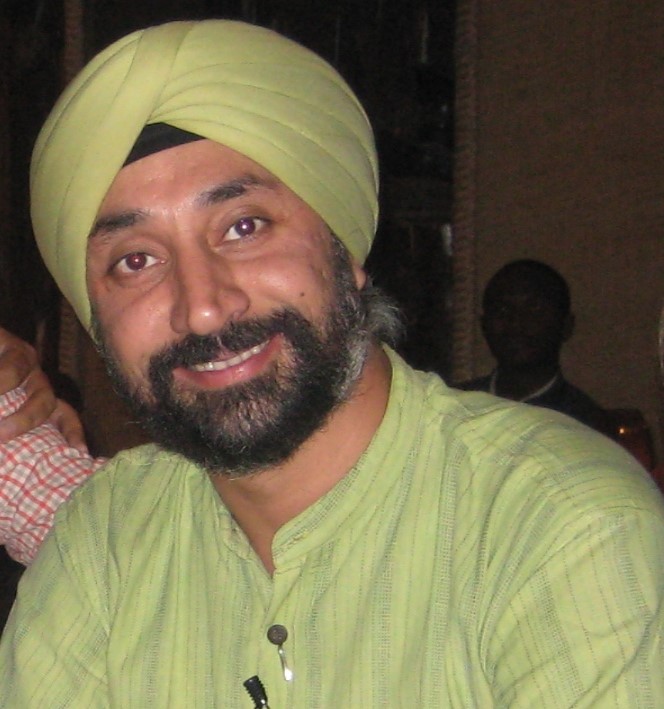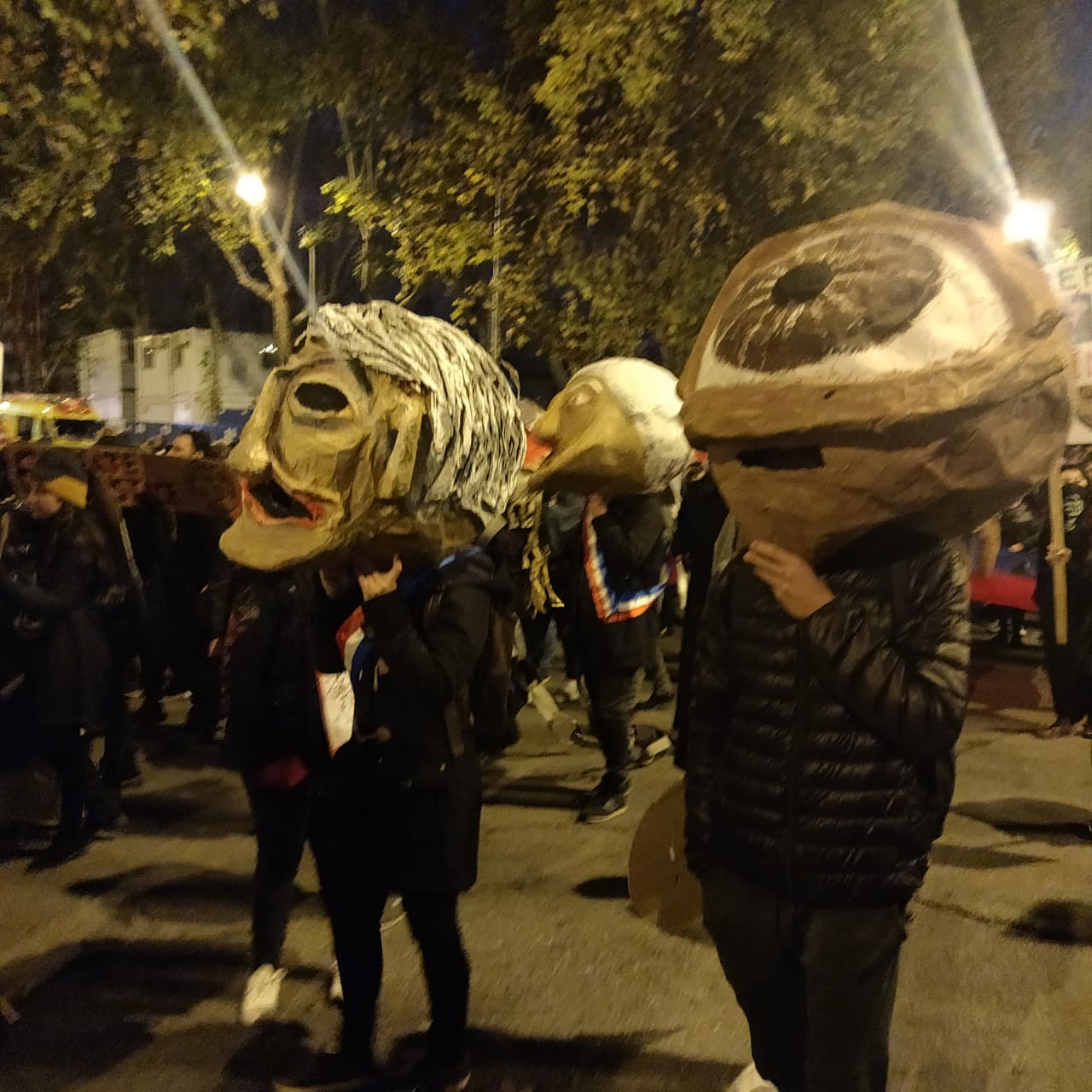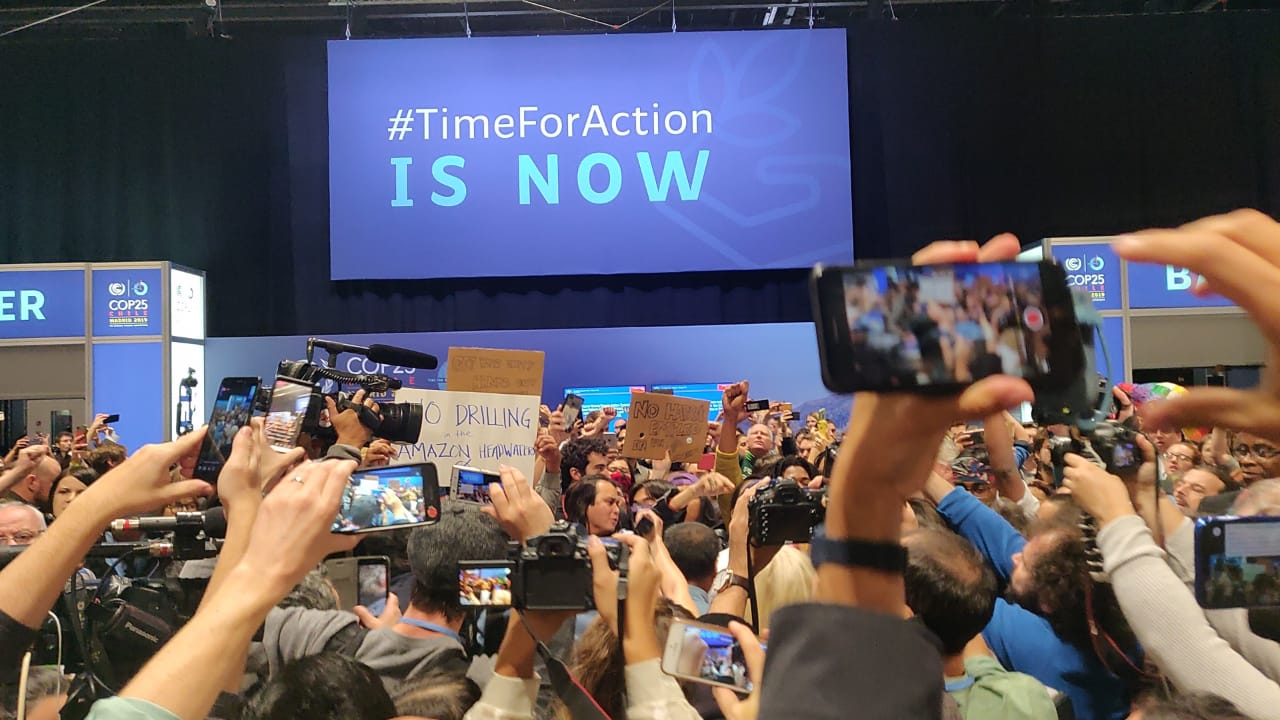The longest ever climate change meet ends without much headway
Frustrated by the lack of action, young people and activists challenged rich industrialised nations to pay up for climate damages

Half a million people marching in cold demanding climate justice. Unprecedented protests inside the conference centre against lack of ambition and apathy towards climate survivors. Heavy-handedness of the UN and private securities pushing out hundreds of protesters. A truly disappointing outcome.
25th meeting of the conference of parties to United Nations Framework Convention of Climate Change or COP25, in Madrid, Spain – the longest ever conference in the history – saw it all.
While, this time, it had only two main issues on the agenda – rules for future carbon markets and supporting the people impacted by climate change – they have been seen as the most contentious ones.
Paris rulebook to operationalise the 2015 agreement was finalised last December in the Polish city of Katowice, but it could not reach consensus on Article 6 – widely known for carbon markets, although the article also has a provision of “non-market approaches” to reduce greenhouse gas (GHG) emissions.
Carbon markets that aim to reduce GHG emissions by setting limits on emissions and enabling the trading of emission units have been widely criticised for weak environmental standards and shifting responsibility from developed to poorer nations.
The critical issues for rulemaking remained – transferring of carbon emissions units and credits from the current regime, namely Kyoto Protocol; eliminating double counting; ensuring environmental integrity; and protecting human rights. While no agreement could be reached on most of these and the agenda is now moved to next year, surprisingly, not everyone seems unhappy.
“Several Parties refused to trade human rights and environmental integrity for carbon markets in Madrid, resulting in the decision being punted to COP26,” said Erika Lennon, Senior Attorney, Center for International Environmental Law (CIEL), USA.
“The climate crisis is a human rights crisis. Failure to act urgently and place human rights at the core of climate action will be measured in human livelihoods, human rights violations, and human lives…. this delay was the only responsible way forward,” Lennon added.
Developing countries and civil society organisations echoed that on carbon markets – “no deal is better than the bad deal” – and many activists protested against setting up any kind of carbon markets.
Old and New Blockers
The US and Australia were blamed for pushing the carryover of carbon credits from the Kyoto regime to be traded on the new market. India, although less vocal, sought a solution arguing that it stands to lose almost $5 billion worth – estimated at “conservative price” of US $20 per unit – of its 250 million carbon credits, if not transferred to post-2020 markets.
Brazil, in addition, tried to justify ‘double counting’ of emissions reductions, creating loopholes that everyone else resisted.
Environment activists demanded that old credits must not be eligible for use after 2020 and the transfer would undermine the Paris goal of keeping the average temperature below 1.5 degrees Celsius. They lashed out at the new government of Brazil for its anti-environment policies and aligning with the US.
Carlos Rittl, Executive Secretary of Climate Observatory, in Brazil, said, “In a depressing turnaround from the cooperative spirit that gave us the Paris Agreement, in Madrid the usual suspects were joined by new blockers, like Brazil.
“The eco-cidal politics of the Bolsonaro administration has tainted the Brazilian delegation at COP25 and made a former environment champion into a Trump-like pariah whose engagement in the fight against climate catastrophe risks becoming nothing more than a signature in a global deal.”

Helping climate survivors
The world now faces more climatic disasters in the form of devastating cyclones, frequent droughts, ravaging floods and rising seas swallowing homes and farmlands faster than projected.
The climate emergency is getting worse with every fraction of rising temperature and requires urgent and institutional response. The UN body, Warsaw International Mechanism for Loss and Damage (WIM), set up in 2013, underwent its mandated review at COP25.
Developing countries insisted that WIM is unable to carry out its operation and is failing to provide any support to the ones already facing ‘loss and damage.’ They demanded a new system and money under the UN to help them, but rich countries, led by the US, with support from Australia, Canada, Japan and European Union, vehemently opposed it.
The biggest historical emitter – US, who is set to leave Paris Agreement in November 2020, arm-twisted heads of delegations of developing country groups to safeguard interest of its administration and polluting industries, without showing any sympathy towards climate affected people.
It made an uncompromising demand to either keep the governance of the WIM, out of UN convention – which it will remain part of despite leaving Paris Agreement – or extend a liability waiver to prevent itself from paying any money for climate damages. Such a stand forced developing countries to defer the decision on governance to the next conference in Glasgow, UK, while partially giving in to US’ demand of keeping the review decision under Paris Agreement, for now. The agreements reached only to set up an expert group on finance and a network to offer technical support.
The US, in connivance with other developed countries, obstructed any progress and watered down the demand to scale up finance across the board, particularly for people already facing climate crisis.
“The role of the US in these talks should be a source of embarrassment for all Americans. It is an offense to the millions of Americans who have been displaced by fires and floods that the US spent its time at the negotiations undermining the negotiations over Loss and Damage that would support those most vulnerable who are suffering similar losses,” said Keya Chatterjee, Executive Director of USCAN – the US chapter of Climate Action Network.
“Nonetheless, for me, the story of this COP is a hopeful one,” she added, referring to the growing movement of young people and civil society groups who protested within and outside the UN conference centre.

Protests and Marches
Two days before the scheduled end of climate talks, hundreds of protesters from civil society organisations, movements, unions, Indigenous People, youth, women and gender groups joined forces to demand rich countries ‘step up and pay up’ to tackle the climate crisis and chanted – ‘Climate Justice Now’. They shouted – Shame! – against lack of ambition by negotiators and aggressive UN security physically pushing them away.
The unprecedented action at such a UN climate conference came after growing frustrations that over a week of climate talks in Madrid had produced little to no progress on several key issues, including the need for the rich countries and polluting industries that have historically driven the climate crisis to provide finance to support communities recovering from climate disasters.
Hundreds of protesters were driven outside of the Feria de Madrid conference centre by security, but the cold did nothing to dampen the spirits and demands for climate justice.
Just five days before, on a cold Friday evening, half a million people marched on the streets of Madrid, joined by Greta Thunberg, to send a clear message to policymakers from nearly 200 nations that “they are watching them” and it is time for action.
Even with two extra days of climate talks, COP25 ended on 15th December with no real help for people suffering climate impacts and weak agreement on raising ambition on emission reduction, despite stark warnings from the United National Environment Programme (UNEP) on steeper cuts required in the next decade to avert catastrophe.
India, being the fourth largest carbon emitter, also faced pressure from developed countries and civil society alike to revise its emission reduction targets upwards, ahead of next year’s conference.
It, however, resisted the demand and in turn pressured rich nations to honour financial commitment for developing countries and meet their targets under the Kyoto Protocol.
After the COP25 debacle by the Chilean Presidency, All all eyes are now on the re-elected UK Prime Minister Boris Johnson government in the UK and his Environment Minister who that faces twin challenge in 2020, – of finalising Brexit deal with the European Union and applying cutting-edge diplomacy to make COP26, a success.
But the hope remains with rests on the rising and powerful climate justice movement, spearheaded by young people around the world, who are exposing empty words of politicians and demanding climate justice with real action.
Harjeet Singh is the Global Lead on Climate Change for ActionAid International and is based in New Delhi. He tweets under @harjeet11.
Views are personal.

